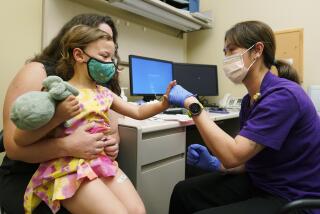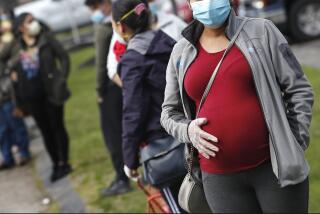Parents who know of preemies’ pain more confident
- Share via
NEW YORK (Reuters Health) - Parents who are taught to recognize and respond to signs of pain in their prematurely born babies are more confident in caring for their children once they leave the hospital, a new study shows.
Parents’ stress levels, however, remain high while their children are still in the hospital, despite being educated on techniques to comfort their babies.
“Pain is one narrow facet of what a parent is faced with in the neonatal intensive care unit,” perhaps limiting how much a pain education program can do to reduce that stress, said Bernadette Melnyk, a professor of nursing at Arizona State University, who was not involved in the new work.
Researchers involved 169 parents who had a child in one of four intensive care units in the London, UK, area. Half the parents received a booklet and two training sessions with a nurse on how to care for their child’s pain, while the other parents received a general parenting booklet and no specific training.
The education included information on how babies process pain, how parents can recognize when their infant is in pain, and techniques for comforting babies during painful procedures.
Linda Franck, the lead author of the study and a professor at the University of California, San Francisco, said parents with children in the neonatal intensive care unit (NICU) typically receive very little formal training on pain management.
Franck’s group surveyed the parents about their stress levels, their attitudes toward parenting, and how well they thought their child’s pain was cared for.
The parents who received the extra training on pain were more satisfied with the pain information they received than the other parents, and wanted to have a bigger part in comforting their babies.
Yet, neither group was more satisfied with the pain care their child received.
And when parents were asked how stressed they felt while the baby was in the hospital, both groups responded similarly, and, not surprisingly, that they were very stressed.
“The sources of stress for parents while their babies are still in the hospital is a very complex issue,” said Franck, and one that might not be able to be treated with this training.
Still, Franck’s training program was tied to better attitudes among parents once they took their babies home.
“When they went home, parents who received the intervention felt more confident and competent in understanding their baby’s stress cues and in comforting their baby,” Franck told Reuters Health.
Franck said parenting confidence at home is especially important, because there’s no more back-up attention from medical staff. “It’s a really vulnerable time for them.”
Though the training program appeared to be limited in how much parents benefited, Franck said she’d like to try improving on the approach. Her group is developing training videos to help parents learn comforting techniques.
Melnyk, who is also the incoming Associate Vice President for Health Promotion and Dean of the College of Nursing at Ohio State University, agreed that Franck’s program is worthwhile. But she would like to see education that includes other aspects of parenting sick children, ranging from basic care like diapering and feeding a preemie, to coping with depression.
“I think anytime we can enhance parent interaction and involvement with NICU babies, the better,” Melnyk said. “But I think there’s a lot more to the parenting piece than just the pain.”






